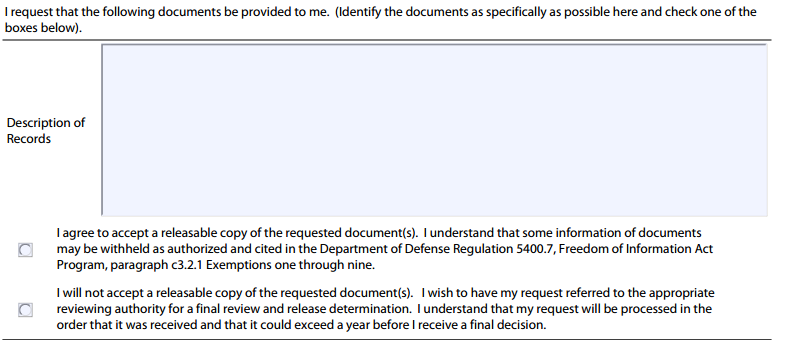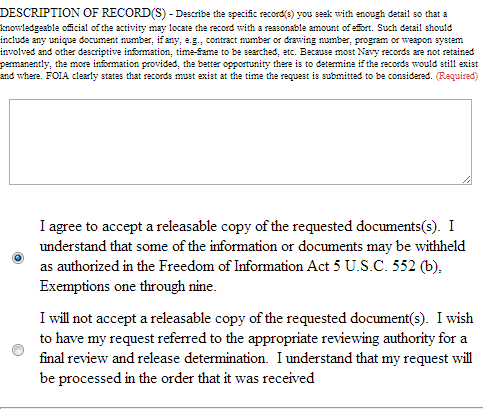UPDATE: We added clarification that our numbers concerning SOCOM’s FOIA appeals were taken from FOIA.gov
At least two military offices have been found to use a puzzling FOIA request form that may be an attempt to get requesters to give up their rights to appeal FOIA decisions.
The request forms, which are included below, appear on the FOIA web sites of the U.S. Army Special Operations Command (SOCOM) and the U.S. Navy’s Space and Naval Warfare Systems Command(SPAWAR). In both forms, the offices ask requesters to agree to accept “a releasable copy” of the requested records; however, they fail to expressly inform requesters that electing this option may legally prevent them from appealing if the agency withholds any records.
If requesters do not agree in advance to accept “releasable” records, the forms indicate that their request will be “referred to the appropriate reviewing authority for a final review and release determination.” This is precisely the procedure that the Department of Defense’s FOIA regulations already require. Specifically, all Department of Defense FOIA requests must be reviewed by a designated “Initial Denial Authority,” and all decisions to withhold requested records must be explained in sufficient detail so as to allow requesters to decide whether to appeal.
Making matters worse, SOCOM’s version of the FOIA request form implies that the referral procedure described above will dramatically increase the time needed to process the request, noting that “it could take a year” for a decision — essentially coercing the FOIA requester to select the “releasable” records option if they want to receive the production in a timely manner. As a result SOCOM’s form has effectively minimized FOIA appeals. During fiscal years 2008 to 2012, SOCOM adjudicated 933 FOIA requests, yet it received zero administrative appeals according to FOIA.gov. Do the zero administrative appeals accurately reflect that in fact there were no appeals by requesters during this four year period regardless of whether they accepted the “releasable” records option, or are these statistics the result of virtually all 933 FOIA requesters abdicating their rights to appeal?
Notably, these forms do not conform to the FOIA request template recommended by the Department of Defense’s main FOIA office. Nor are they even consistent with sample request letters provided by the FOIA offices of the Department of the Navy or the Department of the Army. In the words of Victor Hugo, no army can withstand the strength of an idea whose time has come. It is time for these forms to go.

